Progressive Men of Iowa
1899
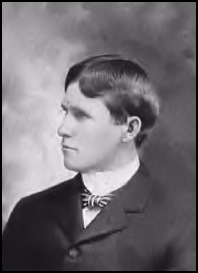 BANDY, Dr. Robert S., of Tipton,
is a progressive dentist, a native Hawkeye, and has
enjoyed the best educational advantages the state
affords. He was born in Des Moines county, Iowa,
November 26, 1863. His father, John Bandy, was among the
earliest settlers of this state. He came to the
territory of Iowa with his parents in the spring of
1837, at the age of 10 years. He settled in Des Moines
county and part of the old home there still remains in
the family name. John Bandy was one of the famous
California Forty-niners. He crossed the plains in
company with other daring and ambitious men in 1849 and
remained in California until 1857, returning by way of
Panama and New York. He was married in 1860 to Miss
Guelmia Stathemn, whose family came to Iowa from Ohio at
an early day. They lived in Des Moines county until
1865, when they removed to Minnesota and lived there
until 1884, when they returned to Iowa. Mr. Bandy served
during the war in the Second Iowa cavalry, commanded by
Col. Wm. P.
Hepburn.
BANDY, Dr. Robert S., of Tipton,
is a progressive dentist, a native Hawkeye, and has
enjoyed the best educational advantages the state
affords. He was born in Des Moines county, Iowa,
November 26, 1863. His father, John Bandy, was among the
earliest settlers of this state. He came to the
territory of Iowa with his parents in the spring of
1837, at the age of 10 years. He settled in Des Moines
county and part of the old home there still remains in
the family name. John Bandy was one of the famous
California Forty-niners. He crossed the plains in
company with other daring and ambitious men in 1849 and
remained in California until 1857, returning by way of
Panama and New York. He was married in 1860 to Miss
Guelmia Stathemn, whose family came to Iowa from Ohio at
an early day. They lived in Des Moines county until
1865, when they removed to Minnesota and lived there
until 1884, when they returned to Iowa. Mr. Bandy served
during the war in the Second Iowa cavalry, commanded by
Col. Wm. P.
Hepburn.
Robert
S. Bandy, having been prepared to enter college,
attended at Parsons college in Fairfield until 1888,
when he entered the dental department of the State
University of Iowa and was graduated from that
institution with the class of 1891. He commenced the
practice of his profession in Fairfield, but soon after
went to Davenport and associated with Dr W. O. Kulp then
a leading practitioner and educator in the state. In
1893 he located in Tipton, where he has since been
engaged in the successful practice of dentistry. Being a studious
and progressive professional man, he belongs to the Iowa
State Dental association and the Eastern Iowa Dental
society.
Dr. Bandy was married in 1893 to
Miss Rebecca Thomas, of Iowa City. They have one child,
Geneva Kathryn, born June 16, 1896.
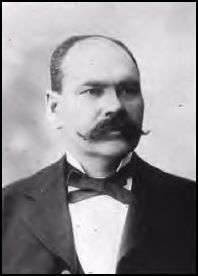 COUTTS, J. H. One of the
solid business men of Cedar county, an able financier
and a model citizen, is John H. Coutts, of Tipton. He
was born in that county, to whose development he has
contributed a lifetime of hard work, on July 20,
1850. He is
the oldest of seven children born of William and Barbara
Banden Coutts.
The father was born in Aberdeenshire, Scotland,
in 1812. He came to this country in 1832, and lived for
a short time in Ashland county, Ohio. In 1837 he came to
Cedar county, Iowa, and settled in Red Oak township,
where he was married in 1849 to Barbara Banden, also a
native of Scotland. He died December 16, 1891.
COUTTS, J. H. One of the
solid business men of Cedar county, an able financier
and a model citizen, is John H. Coutts, of Tipton. He
was born in that county, to whose development he has
contributed a lifetime of hard work, on July 20,
1850. He is
the oldest of seven children born of William and Barbara
Banden Coutts.
The father was born in Aberdeenshire, Scotland,
in 1812. He came to this country in 1832, and lived for
a short time in Ashland county, Ohio. In 1837 he came to
Cedar county, Iowa, and settled in Red Oak township,
where he was married in 1849 to Barbara Banden, also a
native of Scotland. He died December 16, 1891.
J. H.
Coutts was brought up on a farm, and received a common
school education.
Although he has been called to fill the highest
position of responsibility in his county, he has at no
time in his life been a politician or an office seeker,
having little or no ambition in that direction. He has
devoted himself to business, and, while promoting such
enterprises as have proved of inestimable value to the
community at large, has accumulated considerable
wealth. He
was elected county treasurer of Cedar county in 1887 on
the democratic ticket, and was re-elected at the
conclusion of his term of office by an increased
majority.
He then turned his attention to financial
enterprises. He became connected with the First National
bank, of Tipton; was elected its president, and under
the in-fluence of his personality and reputation for
integrity, the business of the concern doubled in a
short time. He is one of those men who always come to
the front in emergencies.
He is a
director in the Electric Light company, treasurer of the
Eastern Iowa Building and Loan association, and director
and treasurer of the Tipton Hotel association, in the
organization of which last named concern he was very
active. In
1892 he located a bank at Stanwood, Iowa, which is known
as J. H. Coutts' bank, a venture which, like all his
others, has proved highly successful. He is progressive,
far sighted in business, honorable to the highest
degree, and generous to a fault - qualities which make
him respected by everyone in the community where he
resides.
In 1896
he took a well-earned vacation, making an extensive
European trip, and returned to his large business
interests at home with renewed vigor, and with an
enlarged acquaintance with his eastern correspondents,
and with financial leaders throughout our
country.
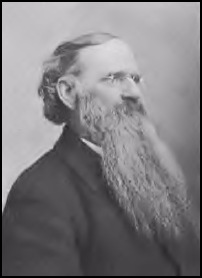 FERGUSON, Joseph P., was
born in Montgomery county, Ind., July 26, 1829. His father,
Price Ferguson, was a farmer, and of Scotch descent. His
mother's ancestors were Germans, and her maiden name was
Mary Shank. Both his father and mother died in one day,
when Joseph was only 3 weeks old. They fell victims to
the mysterious disease, milk sickness, which was so
fatal in the pioneer days of Indiana. Soon after their
death he was taken to the home of his grandfather, Aaron
Ferguson, in Montgomery county, Ohio, where he lived
until 12 years old. He was then placed in charge of his
only sister, Elizabeth Ferguson, who lived in Warren
county, Ind. During the remainder of his youth he lived
with different relatives in Ohio and Indiana, and when a
young man went with his uncle, John Ferguson, to Kendall
county, 111., and leased a farm belonging to another
uncle by the name of Hiddleson. Soon after commencing
work here, he had a severe attack of typhoid fever,
which left him much broken in health, and unable to
continue farm work that season. He then returned to his
sister's home, in Tippecanoe county, Ind., and secured a
position as toll gatekeeper on a new plank road just
built into the city of Lafayette. The next year he
taught school in Warren county, Ind., and in May, 1852,
came with his uncle and located in Jones county, Iowa.
Here he began breaking prairie during the summer with an
ox team and continued it for four seasons, and for
several winters taught school in Cedar and Jones
counties. In the winter of 1858 Mr. Ferguson taught
school in his own dwelling house in Hall township, Jones
county. The parents of his pupils hauled wood to the
house and then the boys chopped it for him. He accepted
for payment for teaching whatever provisions the patrons
happened to have. Mr. Ferguson never had the advantage
of much schooling; his education was mostly acquired by
home study and teaching others. In his first
school he had to study bard to keep ahead of some of the
smart scholars.
FERGUSON, Joseph P., was
born in Montgomery county, Ind., July 26, 1829. His father,
Price Ferguson, was a farmer, and of Scotch descent. His
mother's ancestors were Germans, and her maiden name was
Mary Shank. Both his father and mother died in one day,
when Joseph was only 3 weeks old. They fell victims to
the mysterious disease, milk sickness, which was so
fatal in the pioneer days of Indiana. Soon after their
death he was taken to the home of his grandfather, Aaron
Ferguson, in Montgomery county, Ohio, where he lived
until 12 years old. He was then placed in charge of his
only sister, Elizabeth Ferguson, who lived in Warren
county, Ind. During the remainder of his youth he lived
with different relatives in Ohio and Indiana, and when a
young man went with his uncle, John Ferguson, to Kendall
county, 111., and leased a farm belonging to another
uncle by the name of Hiddleson. Soon after commencing
work here, he had a severe attack of typhoid fever,
which left him much broken in health, and unable to
continue farm work that season. He then returned to his
sister's home, in Tippecanoe county, Ind., and secured a
position as toll gatekeeper on a new plank road just
built into the city of Lafayette. The next year he
taught school in Warren county, Ind., and in May, 1852,
came with his uncle and located in Jones county, Iowa.
Here he began breaking prairie during the summer with an
ox team and continued it for four seasons, and for
several winters taught school in Cedar and Jones
counties. In the winter of 1858 Mr. Ferguson taught
school in his own dwelling house in Hall township, Jones
county. The parents of his pupils hauled wood to the
house and then the boys chopped it for him. He accepted
for payment for teaching whatever provisions the patrons
happened to have. Mr. Ferguson never had the advantage
of much schooling; his education was mostly acquired by
home study and teaching others. In his first
school he had to study bard to keep ahead of some of the
smart scholars.
In the
summer of 1860, allured by the report of rich gold
discoveries near Pike's Peak, he crossed the plains to
Colorado.
In company with John Weeks he drove a pair of
oxen, yoked to a light wagon, and led a cow behind the
wagon to insure a supply of milk. While he was making
this trip, which yielded more experience than gold, the
immortal Abraham Lincoln was nominated for
president.
On
August 6, 1862, Mr. Ferguson enlisted in Company G,
Thirty-first Iowa volunteers, and went with the regiment
to Helena, Ark. He was soon promoted to the position of
second lieutenant, but his health, which was always
delicate, soon failed and he was sent to the hospital at
Memphis and afterwards transferred to one at St. Louis.
Here he became very sick, and his wife was sent for and
took him home. For two years after returning from the
army Mr. Ferguson lived on the farm, and then began
buying grain and stock, and continued in this business
for several years. In 1869 he was appointed postmaster
of Clarence, Iowa, by President Grant; held the office
for nearly seventeen years, and resigned when Cleveland
was elected, although his democratic friends urged him
to make application for reappointment, and offered to
sign a petition in his favor. When he retired from the
post office the patrons, regardless of party, presented
Mr. Ferguson and his daughter Helen each with a gold
watch and chain.
For
three terms Mr. Ferguson was elected mayor of Clarence.
While attending to his duties as postmaster, he studied
law, and on the 25th of February, 1875, was admitted to
practice, at the age of 46 years. On March 80, 1856, he
was married to Miss Persia Delamater, a native of Lewis
county, N. Y., and a most estimable woman. They have
seven children: Mary E., Mamie E., now Mrs. Lamos, of
Stuart, Iowa; Davie F., who died August 15, 1882, aged
22; Jennie V., now Mrs. Flansburg, of
Glidden, Iowa; Helen M., now Mrs. Cook, of Jacksonville,
111.; Josie P., now Mrs. Lantz, of Sioux City, Iowa; and
J. P. W. C. Ferguson.
Mr.
Ferguson voted for John C. Fremont for president, and
has ever since been a hard worker for the republican
party, until the passage of the mulct law and the law
allowing the manufacture of liquor. Since then he has
acted with the prohibitionists and has been a worker in
the temperance cause for many years. Among the young
men who have profited by Mr. Ferguson's experience and
advice, and have had the advantage of reading in his law
office, are Mr. S. E. Starrig, of Fayette; T. J.
Garrison, of Denison; Prof. George D. Skinner, of
Clinton; Prof.
J. H. Morgan, of Clarence; Prof. Harry Ferguson,
of Tama City; N. H. Kent and Fred Orelup.
As this
outline indicates, Mr. Ferguson is a man of strong
character, and an original thinker. He has always
believed that he was called to preach, but resisted the
spirit.
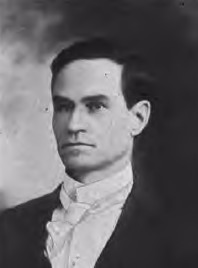 GEIGER, Hon.
William G. W., of Tipton, is well known throughout the
state as a lawyer and politician. He possesses a fine
judicial mind and great mental and physical activity. He
is a native of Cedar county, born on the old homestead
entered by his father, in time to be old enough to just
remember the return of the boys in blue from the war of
the rebellion. It was there the long winter evenings
were spent in study; there was laid the foundation for a
classical education, and there were acquired the habits
of industry, which have enabled him to become a man of
affairs. In September, 1874, he entered college at
Carthage, 111., where he took the classical course,
graduating in the spring of 1879, at the age of 22
years. At that time he received the degree of bachelor
of arts, and three years later the honorary degree of
master of arts. He was a member of Cicero Literary
society during his college days, and as such earned
considerable distinction.
GEIGER, Hon.
William G. W., of Tipton, is well known throughout the
state as a lawyer and politician. He possesses a fine
judicial mind and great mental and physical activity. He
is a native of Cedar county, born on the old homestead
entered by his father, in time to be old enough to just
remember the return of the boys in blue from the war of
the rebellion. It was there the long winter evenings
were spent in study; there was laid the foundation for a
classical education, and there were acquired the habits
of industry, which have enabled him to become a man of
affairs. In September, 1874, he entered college at
Carthage, 111., where he took the classical course,
graduating in the spring of 1879, at the age of 22
years. At that time he received the degree of bachelor
of arts, and three years later the honorary degree of
master of arts. He was a member of Cicero Literary
society during his college days, and as such earned
considerable distinction.
He
commenced the study of law in the office of Wolf &
Landt at Tipton in the fall of 1879, and was admitted to
the bar the following year, after which he read law in
the office of Blake & Hormel, at Cedar Rapids. In
the fall of 1881 he opened an office in Tipton and laid
the foundation for a successful professional and
business career. His first fee in the practice of his
profession was earned in defending one charged with a
felony. He secured the discharge of his client on
preliminary hearing. He now enjoys a practice that is
second to none in his native county. In his fifteen
years of practice he has covered all lines of court work
and has had entrusted to his care many extensive and
complicated cases wherein the responsibility was great,
in all of which he has performed his duties to the
satisfaction of all concerned. He has the confidence of
the courts before which he is in almost constant
practice, and is held in the highest esteem by his
brothers in the profession.
Mr.
Geiger is a democrat and says he expects to affiliate
with that party as long as its principles come nearest
to his convictions, but only so long. He places party
second to individual conviction. He has never held
office nor sought political preferment, believing it the
best policy to keep out of politics as far as possible
until such a time as one has become independent as he
cares to be financially. However, in
1888, when Cedar county was in the republican column, he
was nominated for county attorney on the democratic
ticket, and through loyalty to party permitted his name
to go before the people. Although
defeated, he reduced the republican majority to
fourteen, running far ahead of his ticket. This splendid
endorsement led to his nomination for judge of the
Eighteenth judicial district in 1890, and again in 1896,
to fill the vacancy caused by the death of Judge William
P. Wolf, but he was defeated in both instances by reason
of the political complexion of that section.
Mr.
Geiger has been a diligent reader all his life and has
traveled extensively. His father's
home was well supplied with good books and the family
custom of reading aloud stimulated the taste for
profit-able reading. Mr. Geiger feels grateful to his
parents for the correct ideas they gave him in his
boyhood, and especially for teaching him habits of
industry.
Jacob
Geiger, father of William, was a native of Germany. He
came to this country when 8 years of age, and was given
a college education, after which he learned the trade of
currier and tanner. He located in
Cedar county in 1863. and died there in 1894, owning the
same old farm he had entered, though it had grown to 520
acres. He was a candidate for congress on the greenback
ticket against Hiram Price. The mother's maiden name was
Elizabeth Lichtenwaiter. She was born near Taneytown,
Md.; came to Iowa in 1852, and here met and married
Jacob Geiger. Of this marriage there are seven children
living: Mrs. Anna E. Cravens, of Lake
City, Minn.; W. G. W. Geiger, the subject of this
sketch; Judge A. C T. Geiger, of Oberlin, Kan.; Mrs. H.
Ruth Emahlzer.of Oberlin, Kan.; Mrs. M. Alice Spielman,
of Fairfield, Iowa; Etta I. Geiger and Jacob L. Geiger,
who are now with their mother at Long Beach, Cal.
Mr.
Geiger made a trip in 1896 to Mexico to learn more of
the Aztecs, the Toltecs and the Montezumas by personal
research and to study the silver question. He traveled
about 4,000 miles in that strange republic. Mr. Geiger
has tried to make the most of his surroundings and
circumstances, and by hard work and close application
avoid the jarring and discordant sounds of the closing
doors of lost opportunities. He has been
across the continent by two different routes, camped
through the Yellowstone National Park, in northwest
Wyoming, with its hot springs, geysers, beautiful lakes,
gorgeous canon and magnificent scenery; visited the
Grand Canon of the Colorado river in Arizona, been
around the lakes on the north and to the Gulf on the
south of our country; loves the quiet scenery of the
little Alleghenies and the rugged, wonderful views of
the towering Rockies. Mr. Geiger takes great delight in
the beauties of nature, enjoys the flowers, and finds
much pleasure in music. He weaves past experiences
together to aid in the judgments of the present. He
likes to look back along the "River of Time" and see the
achievements of the centuries as well as to reflect upon
the ruined hopes and wrecked fortune that strew its
shores.
He was
married April 7,1885, to Miss Flora H. Manler, daughter
of W. H. Manler, a lawyer of Carthage, 111. She was his
classmate in college and graduated in the classical
course with him.
But death came and the husband is left with four
little daughters, Maud Marguerite, Laura Helen, Sarah
Gertrude and Flora Miriam, now with their grandparents
at Carthage. Mr. Geiger is a member of the Odd Fellows,
Knights of Pythias and Modern Woodmen of America
fraternal societies, and is also a member of the
Lutheran church. In 1895 he was a delegate to the
general synod of that church in Hagerstown,
Md.
He built at Tipton, in the summer
of 1897, a substantial and pretty office building with
granite front for his own use.
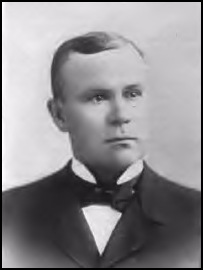 HANLEY, Thomas B., one
of the self-made and successful men of Tipton, was born
in Cleveland, Ohio, December 11,1852. He was one of a
family of ten children, four of whom are dead. One
brother, D.
R. Hanley, is a steamboat engineer, who, with a
sister, Mrs. Claus Rolfs, lives in Davenport: one
brother, W. H. Hanley, a lawyer, and another brother, M.
L. Hanley, also a steamboat engineer, live in Dubuque;
another brother, J. A. Hanley, a lawyer, lives in
Davenport. Mr. Hanley 's father and mother came to
America from Ireland in the spring of 1852, locating at
Cleveland, Ohio. His father was a laborer in ordinary
circumstances, and with a family of ten children it was
necessary that they should learn in their early years to
be of use to themselves and to others. The family
removed to Scott county, Iowa, in 1856.
HANLEY, Thomas B., one
of the self-made and successful men of Tipton, was born
in Cleveland, Ohio, December 11,1852. He was one of a
family of ten children, four of whom are dead. One
brother, D.
R. Hanley, is a steamboat engineer, who, with a
sister, Mrs. Claus Rolfs, lives in Davenport: one
brother, W. H. Hanley, a lawyer, and another brother, M.
L. Hanley, also a steamboat engineer, live in Dubuque;
another brother, J. A. Hanley, a lawyer, lives in
Davenport. Mr. Hanley 's father and mother came to
America from Ireland in the spring of 1852, locating at
Cleveland, Ohio. His father was a laborer in ordinary
circumstances, and with a family of ten children it was
necessary that they should learn in their early years to
be of use to themselves and to others. The family
removed to Scott county, Iowa, in 1856.
After
leaving the public schools Mr. Hanley attended
the Iowa Agricultural college for one year and was a
member of the Bachelors' Debating society. He afterwards
entered the law department of the State university,
graduating in 1880. His first work outside of his own
home was in a sawmill. At this time he also taught
school off and on for ten years. After completing his
law studies he located at Le Claire, Scott county, in
1880, where he practiced law until 1888, when he removed
to Tipton and formed a partnership with Hon. William P.
Wolf. This partnership continued until 1894 when Mr.
Wolf became judge of the district court. Mr. Hanley
continued his practice alone and has had no partner
since. He is a prominent member of the Knights of
Pythias and was elected grand chancellor of the Knights
of Pythias of Iowa, in 1895. He was unanimously elected
representative to the supreme lodge in 1897. He was one
of six men to organize the Modern Brotherhood of
America, a fraternal beneficiary association. He is
president of the association. The organization
has been remarkably successful from the start, thus
reflecting much credit upon its
originators.
Mr.
Hanley was a democrat until 1882, when he became a
republican. He was mayor of Tipton for two years, and it
was largely through his influence that Tipton has one of
best electric light plants in the state.
Besides
being a Knight of Pythias he is a Mason, and belongs to
the Modern Brotherhood of America, also Modern Woodmen
of America. He was married October 7, 1880, to Miss
Flora Free, of Port Byron, 111. They have one child:
Edna, born August 16, 1882. Without assistance Mr.
Hanley worked his way up in the world, reaching a goodly
position in society, in his profession and in the esteem
of all who know him.
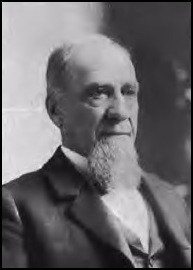 HECHT, Frederick, of Clarence, is
one of the pioneers of Cedar county, having located
there in 1855. His father, John Hecht, came from
Westenburg, Germany, in 1832, and settled in West
Newton, Westmoreland county, Pa. He was a stone mason
and contractor. He married Louise Catherine Eisle. They
reared a family of four children: John Hecht, of Ida
Grove; Henry Hecht, of Tipton; Fred Hecht, of Clarence,
and Mrs. H. A. McKelvey, of Chicago. In 1854 Mr. Hecht
removed his family to Iowa and went to farming.
HECHT, Frederick, of Clarence, is
one of the pioneers of Cedar county, having located
there in 1855. His father, John Hecht, came from
Westenburg, Germany, in 1832, and settled in West
Newton, Westmoreland county, Pa. He was a stone mason
and contractor. He married Louise Catherine Eisle. They
reared a family of four children: John Hecht, of Ida
Grove; Henry Hecht, of Tipton; Fred Hecht, of Clarence,
and Mrs. H. A. McKelvey, of Chicago. In 1854 Mr. Hecht
removed his family to Iowa and went to farming.
Frederick was born in West
Newton, Pa., February 13, 1836. When 16 years old be
went to Pittsburg and served an apprenticeship of three
years with C. Yeager & Company, in the mercantile
business. At the end of that period he came to Tipton,
Iowa, and entered the store of Friend & Culbertson
as a clerk.
He was an active, energetic young man and a good
and trustworthy clerk. He was ambitious and had always
saved his money, and in 1861 was able to buy a one-third
interest in a store belonging to Friend & Culbertson
at Clarence. He was manager of this store which was
operated under the name of Fred Hecht & Company. So
successful was the business that Mr. Hecht was able to
buy the interest of Friend & Culbertson, and in 1863
Mr. K. H. Reed came into the firm, which then became
Hecht & Reed. They did a large general merchandise
and banking business and bought stock and grain for many
years. In 1878 Mr. Reed sold his interest in the
business to Mr. Hecht and retired from the firm. In 1885
Mr. Hecht retired from the merchandise business and went
into banking exclusively. This was continued with great
success for many years, and in 1894 the Clarence Savings
bank was organized by Mr. Hecht and he was made
vice-president He is now interested in the large
clothing store of which his son, Charles B. Hecht is
manager.
He has
been a very extensive land owner, having at one time
more land than any other one person in the county. He still has 600
acres, 350 of which adjoins the town of Clarence, and is
highly improved, with a handsome residence, substantial
barns, all supplied by a private system of waterworks.
He is largely interested in raising fine stock, having a
herd of pure-bred Jersey cattle. Mr. Hecht's long
residence in the county and his splendid success in
various lines of business have given him a wide
acquaintance.
In business circles he has always been foremost
in all public affairs; he is always for the best
interests of his hometown. He is a member of the Knights
of Pythias, and has always voted the democratic
ticket.
Mr.
Hecht was married June 8, 1865, to Margaret E. Bossert.
They have three children: Winifred E., now Mrs. John
T. Moffit, of Tipton; Charles R., and Eleanor
L.
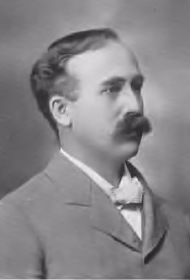 MOFFIT, John T., of
Tipton, lawyer and man of affairs, is a son of Hon. Alex
Moffit who was a member of the Sixteenth General
Assembly of Iowa. The father was born in 1829, in the
county of Tyrone, Ireland, and came with his father to
America and settled in Cedar county in 1840, where he
has since resided. He is a farmer and lives on his farm
and personally directs the management.
MOFFIT, John T., of
Tipton, lawyer and man of affairs, is a son of Hon. Alex
Moffit who was a member of the Sixteenth General
Assembly of Iowa. The father was born in 1829, in the
county of Tyrone, Ireland, and came with his father to
America and settled in Cedar county in 1840, where he
has since resided. He is a farmer and lives on his farm
and personally directs the management.
The
mother's maiden name was Martha J. Poteet, who was born
near Dayton, Ohio, in 1840, and came to Iowa in
1857. John
T. Moffit was born on his father's farm, near
Mechanicsville, Cedar county, Iowa, July 8, 1862. He
attended the common schools of that county from 1868
until 1876, after which he spent three years in the
Mechanicsville high school. In September, 1879, he
entered the preparatory department of Cornell college,
at Mt. Vernon, took the classical course, and on June
16, 1884, graduated with the degree of A. B. He was
manager of the college baseball team for two years and
held various offices in the Adelphian Literary
society. He
then entered the University of Michigan, at Ann Arbor,
and July 1, 1886, graduated from the law department with
the degree of LL. B.
In
June, 1887, Cornell college conferred upon him the
degree of A. M. In 1885 he enlisted as a private in the
Iowa National Guard and rose successively to orderly
sergeant and second lieutenant in 1889, captain in 1890,
and major in 1894.
Governor Shaw issued his call for volunteers for
the Spanish-American war on April 25, 1898. On this day
Lieutenant-Colonel Moffit had been in his office
attending to business as usual and was called from his
bed about midnight by a message directing him to report
at Des Moines forthwith to be enrolled. The next
morning, after having travelled across half the state,
found him reporting to the adjutant general for duty, at
9:30 a. m. He was enrolled as major of the Fiftieth Iowa
on April 26; mustered into the United States service on
May 18th, and on August 20th was promoted to
lieutenant-colonel of the Fiftieth Iowa Volunteer
infantry.
This regiment was the first to leave Iowa for the
south. He was regularly mustered out, with his regiment,
on November 20, 1898.
After
his college days were over he formed a law partnership
with Charles E.
Wheeler, under the firm name of Wheeler &
Moffit, and commenced business November 1, 1887, at
Tipton, Iowa. September 1, 1894, Judge J. H. Preston
resigned his seat on the district bench and became
associated with the firm of Wheeler & Moffit under
the firm name of Preston, Wheeler & Moffit, and
immediately the new firm opened an office in Cedar
Rapids, to be conducted in connection with the one at
Tipton. Mr. Wheeler withdrew September 1, 1897, and the
firm is now Preston & Moffit. Judge Preston has
charge of the business in Cedar Rapids and resides
there, while Mr. Moffit looks after the practice in
Tipton. They have been connected with all the important
litigation of Cedar county and are regarded as a strong
firm.
Lieutenant-Colonel Moffit
has always been a republican. He was a delegate from
Iowa to the republican national convention which met at
Minneapolis in 1892, being but 29 years of age at that
time. He was one of the youngest members of that body,
certainly the youngest of the Iowa delegation. He takes
an active interest in politics, but has never sought
office. In the spring of 1896, Tipton was organized into
a city of the second class and he was elected its first
mayor under the new order, although against his wish. He
was president of the Republican club of Cedar county in
1888, and held a similar office in the McKinley club of
Tipton in 1896. He was married to Miss Winifred E.
Hecht, daughter of Fred and Margaret E. Hecht, at
Clarence, Iowa, September 28, 1892. Has one
daughter, Margaret Eleanor, born May 6, 1897.